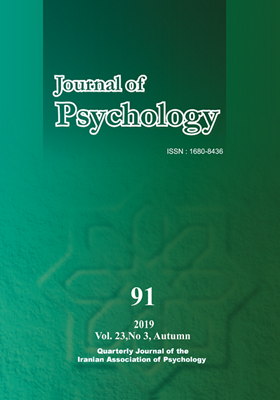Conceptualization of Students’ Academic Passion in Mathematic based on Qualitative Study of Foundation Data
Subject Areas : Psychology
Mahsa Saleh Najafi
1
,
Elahe Hejazi
2
![]() ,
Parvin Kadivar
3
,
Masoud Gholamali Lavasani
4
,
Parvin Kadivar
3
,
Masoud Gholamali Lavasani
4
1 - Faculty of Psychology and Education, University of Tehran, I.R.Iran
2 - Faculty of Psychology and Education, University of Tehran, I.R.Iran
3 - Faculty of Psychology and Education, University of Tehran, I.R.Iran
4 - Faculty of Psychology and Education, University of Tehran, I.R.Iran
Keywords: academic passion, intent to engage in the activity, positive emotions, identification with activity, need for cognition,
Abstract :
The purpose of present study was to investigate the concept of academic passion in math among adolescence. Therefore, this investigation attempts to study conceptualization of academic passion in math from the perspective of adolescents with a qualitative method, interviews with focus group, and grounded theory approach. Participants in this study were 51 adolescents (24 girls and 27 boys).Three focus group were composed in female student’s school, and four groups were constituted in male student’s schools. The results regarding student’s academic passion in math were categorized in four categories of “intent to engage in the activity”, “positive emotions”, “future perspective and identification with activity” and “need for cognition”. Also the results were related to factors affecting academic passion in math categorized in three categories of “family”,“teacher” and “individual features” and finally results were related to consequences of academic passion in math categorized in 5 group “resiliency”, “hope”, “information processing styles”, “self-efficacy”, “subjective well- being”.
Cohen, L. M. (2011). Natural acceleration: Supporting creative trajectories. Roeper Review, 33(4), 218-227.
Coleman, L. J., & Guo, A. (2013). Exploring children’s passion for learning in six domains. Journal for the Education of the Gifted, 36(2), 155-175.
Deci, E. L., & Ryan, R. M. (2000). The "what" and "why" of goal pursuits: Human needs and the self-determination of behavior. Psychological Inquiry, 11(4), 227-268.
Dixon, T. (2003). From passions to emotions: The creation of a secular psychological category. Cambridge University Press.
Fredricks, J. A., Alfeld, C., & Eccles, J. (2010). Developing and fostering passion in academic and nonacademic domains. Gifted Child Quarterly, 54(1), 18-30.
Glaser, B., & Strauss, A. (1967). Grounded theory: The discovery of grounded theory. Sociology The Journal of The British Sociological Association, 12, 27-49.
Grenier, S., Lavigne, G. L., & Vallerand, R. J. (2009). Passion for collecting: A look at determinants and outcomes. Manuscript in preparation.
Houlfort, N., Vallerand, R. J., Forest, J., Lavigne, G. L., & Koestner, R. (2011). On the role of passion for work in psychological well-being. Paper submitted for publication.
Mageau, G. A., Vallerand, R. J., Charest, J., Salvy, S. J., Lacaille, N., Bouffard, T., & Koestner, R. (2009). On the development of harmonious and obsessive passion: The role of autonomy support, activity specialization, and identification with the activity. Journal of Personality, 77(3), 601-646.
Marsh, H. W., Vallerand, R. J., Lafrenière, M. A. K., Parker, P., Morin, A. J., Carbonneau, N., ... & Salah Abduljabbar, A. (2013). Passion: Does one scale fit all? Construct validity of two-factor passion scale and psychometric invariance over different activities and languages. Psychological Assessment, 25(3), 796.
Moeller, J. (2013). Passion as concept of the psychology of motivation. Conceptualization, assessment, interindividual variability and long term stability (Doctoral dissertation).
St‐Louis, A. C., Carbonneau, N., & Vallerand, R. J. (2016). Passion for a cause: How it affects health and subjective well‐being. Journal of Personality, 84(3), 263-276.
Vallerand, R. J. (2008). On the psychology of passion: In search of what makes people’s lives most worth living. Canadian Psychology/Psychologie Canadienne, 49(1), 1.
Vallerand, R. J. (2010). On passion for life activities: The dualistic model of passion. Advances in Experimental Social Psychology, 42, 97-193.
Vallerand, R. J. (2012). The role of passion in sustainable psychological well-being. Psychology of Well-Being: Theory, Research and Practice, 2(1), 1.
Vallerand, R. J. (2015). The psychology of passion: A dualistic model. Series in Positive Psychology. Oxford University Press.
Vallerand, R. J. (2016). The dualistic model of passion: Theory, research, and implications for the field of education. In Building Autonomous Learners (pp. 31-58). Springer, Singapore.
Vallerand, R. J. (2017). On the two faces of passion: The harmonious and the obsessive. In The Science of Interest (pp. 149-173). Springer, Cham.
Vallerand, R. J., & Rapaport, M. (2017). The role of passion in adult self-growth and development. In Development of self-determination through the life-course (pp. 125-143). Springer, Dordrecht.
Vallerand, R. J., Blanchard, C., Mageau, G. A., Koestner, R., Ratelle, C., Léonard, M., ... & Marsolais, J. (2003). Les passions de l’ame: On obsessive and harmonious passion. Journal of Personality and Social Psychology, 85(4), 756.
Vallerand, R. J., Rousseau, F. L., Grouzet, F. M., Dumais, A., Grenier, S., & Blanchard, C. M. (2006). Passion in sport: A look at determinants and affective experiences. Journal of Sport and Exercise Psychology, 28(4), 454-478.


